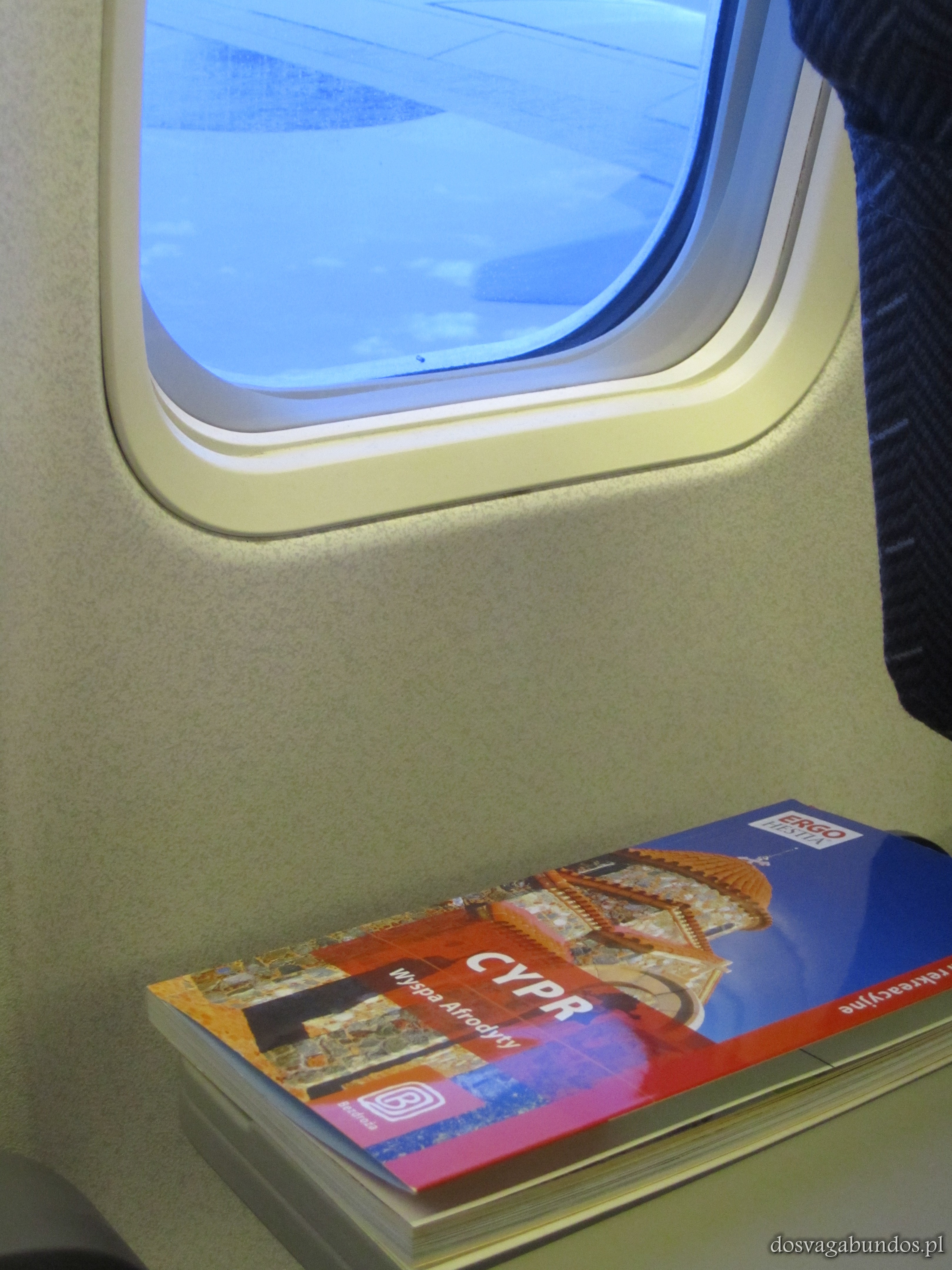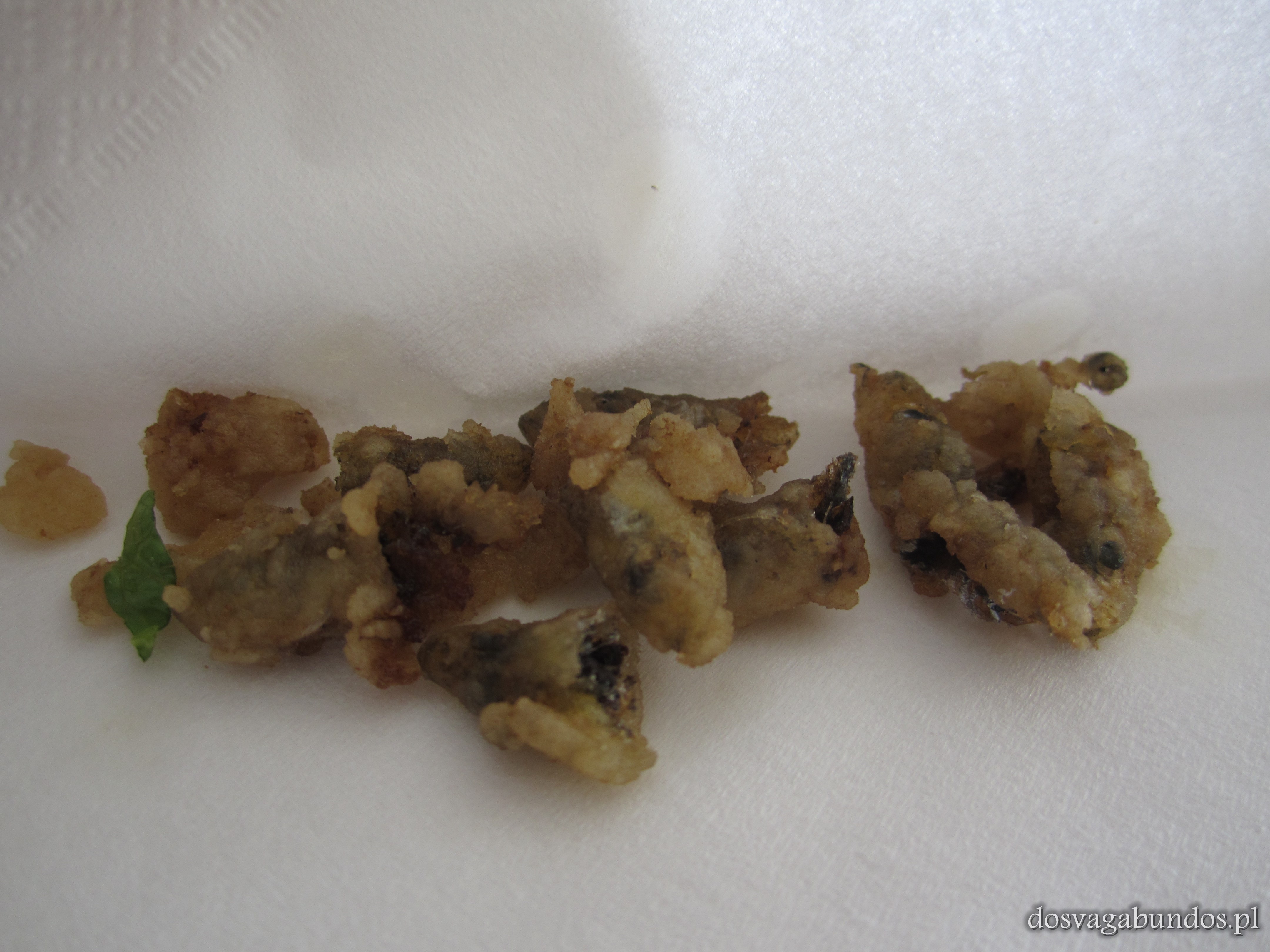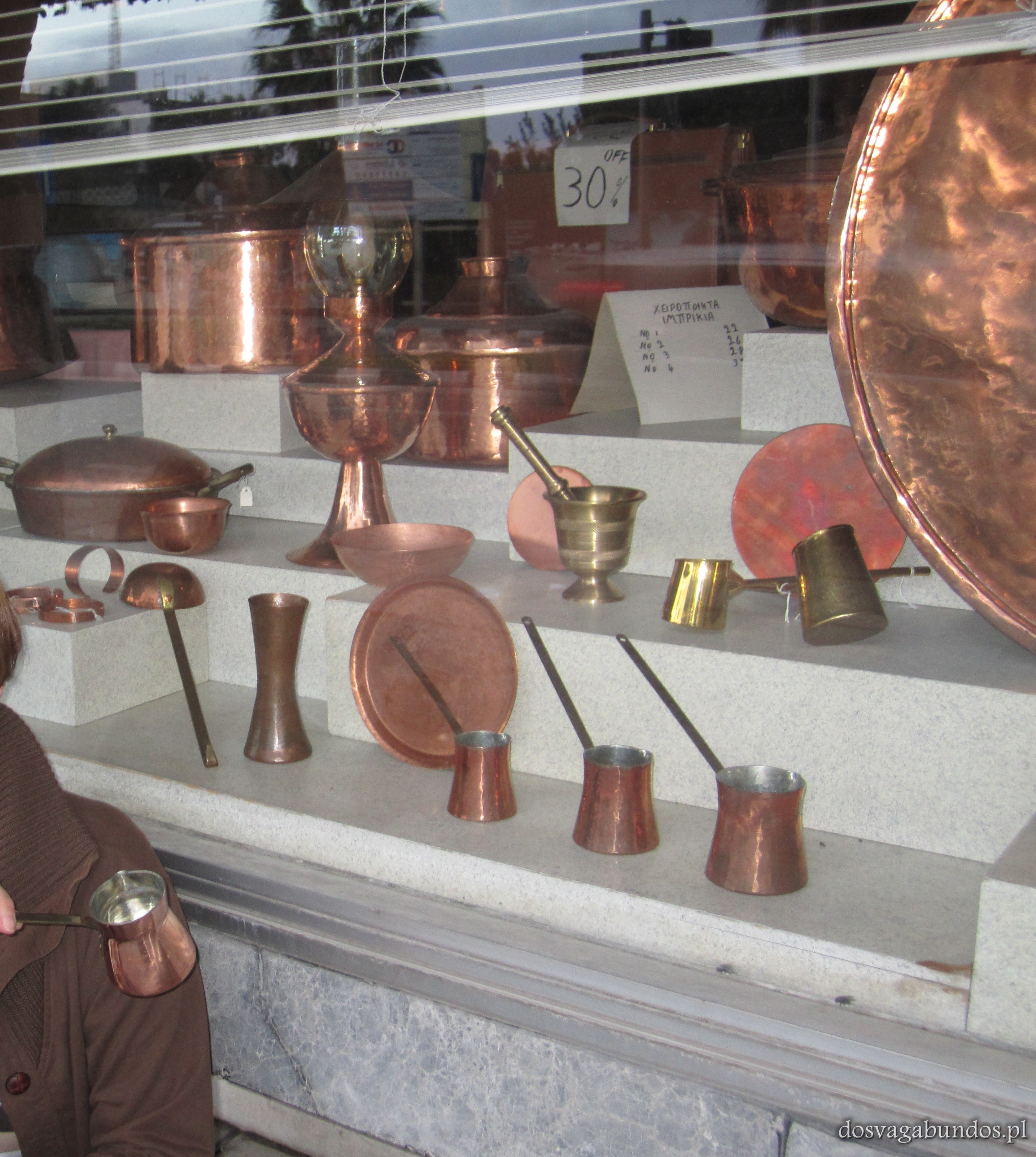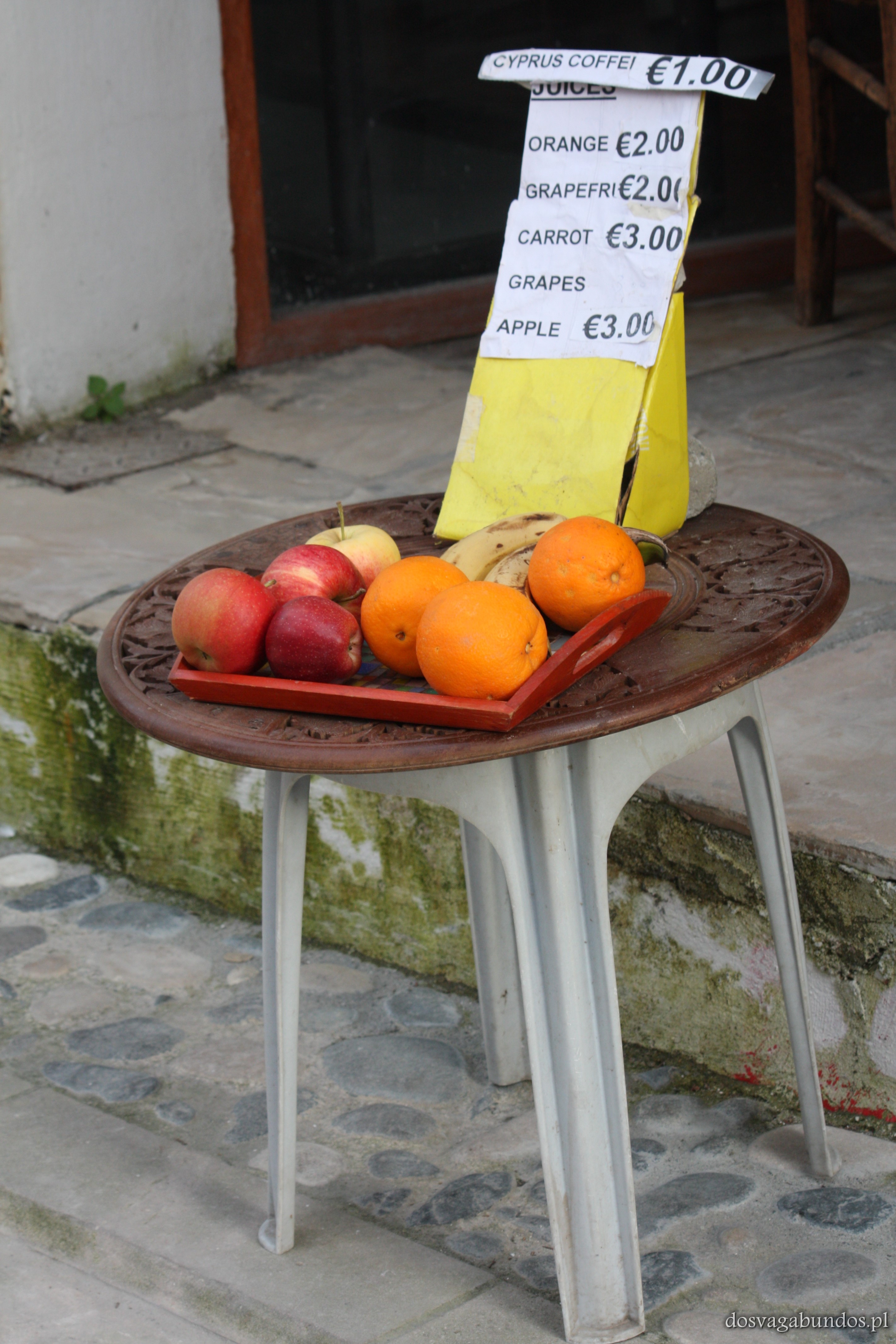Kojarzycie taką sytuację: sobota wieczór, impreza, wszyscy w szampańskich nastrojach, wypełnieni po brzegi dobrym humorem, umawiają się na wyjazd.
“Koniecznie, będzie cudownie, wybawimy się po wsze czasy!”.
Dwa tygodnie później, gdy wracasz z tematem, połowa osób się wykrusza, następnie 3/4, aż w końcu zostajesz ze swoimi planami sam. Brzmi znajomo?
Z taką właśnie przysłowiową ręką w nocniku zostałam kilka zim temu, w drugiej dzierżąc wniosek o tygodniowy urlop. Już miałam zrezygnować, gdy w sukurs przyszła mi Pani Mama.
Uratowana, jedziemy! Ale gdzie?
Skoro z Mamą, to lepiej z biurem podróży, żeby nie narażać się na zbytnie niedogodności. I żeby nie było za gorąco, ani za zimno. Tylko, że na Kanarach już byłyśmy. No i niech będzie plaża, morze, ale też fajne zabytki do zwiedzania. Mogą być góry, i jezioro, i piękne widoki…
“Cypr!”- przerwał nam słowotok Pan Andrzej z zaprzyjaźnionego biura PortSpin (link). “Spełnia wszystkie wymienione przez Panie warunki”.
Jakoś nie byłam przekonana. Nigdy wcześniej nie zwracałam na te śródziemnomorską wyspę uwagi. Mało promowany, nie kojarzący mi się z niczym szczególnym…Ponieważ jednak nie miałyśmy żadnej sensownej alternatywy, nie pozostało nam nic innego, jak spróbować.
Spałyśmy w portowym mieście Limassol. A konkretnie w hotelu Poseidonia Beach, który ostatnio musiał chyba przejść gruntowny remont, ponieważ “za naszych czasów” trącił późnym Gierkiem, a teraz wygląda naprawdę ok. Poza względami estetycznymi pokoju kompleks już wtedy był idealnym wyborem – przy samej plaży, z krytymi basenami, tarasami oraz innymi cudami, położony nieopodal centrum, lecz na tyle daleko, bo nie być atakowanym przez hordy turystów. Wieczorami grałyśmy z emerytowanymi Brytyjczykami w bingo lub obcowałyśmy z miejscową kulturą “niewysoką”, w ciągu dnia natomiast joga na plaży i bardzo smaczne jedzenie, którego połowa lądowała w żołądkach rozpanoszonych wszędzie kotów. Mruczki wyjątkowo upodobały sobie Wyspę Afrodyty i bezczelnie domagały się pieszczot oraz jedzenia na każdym kroku. Niektóre osiągnęły klasę ekspert w tej dziedzinie, dlatego też co i raz natykałyśmy się na sobowtóry Garfielda.
Nie będę owijać w bawełnę i bez bicia publicznie przyznam, że jestem fatalnym kierowcą. Na Cyprze zaś samochody jeżdżą lewą stroną. Te dwa czynniki sprawiły, że Mama postanowiła nie zawierzać mi naszych dwóch duszyczek i kategorycznie odmówiła jeżdżenia wypożyczonym na miejscu samochodem. Pozostała więc nam komunikacja lokalna, własne nogi, oraz biura podróży. Z tych ostatnich korzystałyśmy na dalsze trasy, ale o tym w następnym poście.
Mimo iż Limassol jest drugim co do wielkości miastem na Cyprze, dość szybko rozwijającym się i sięgającym aż gór Trodos, kryje w sobie ciekawą, historyczną zabudowę, osadzoną w miejscach spokojnych, przytulnych i bardzo tamtejszych z natury. Można do tych mieszących się w ścisłym centrum perełek dotrzeć ambitnym spacerem plażą (dobrych kilka kilometrów w jedną stronę), albo autobusem (tylko pamiętajcie, że przystanki będą poustawiane po przeciwnej stronie, niż sugerowałby to polski umysł).
Kluczową budowlą ichniejszego śródmieścia jest średniowieczny zamek i jego wieża, gwarantująca zacny widok na okolicę. Prawdziwą przyjemność jednak sprawia niespieszne włóczenie się po labiryncie wąskich uliczek, wsadzanie nosa w gry planszowe wspartych na laskach emerytów, zbieranie porozsiewanych na chodnikach cytrusów i oglądanie rękodzieła – lokalnego, bądź tego Made in China. My upolowałyśmy oryginalne kawiarki, których do dzisiaj używamy w kuchni. Zresztą od dłuższego czasu jestem zdania, że jeśli już planujemy przytaszczyć ze sobą pamiątki z podróży, warto wybrać coś, co się później zje, wypije, albo co jest po prostu funkcjonalne (niestety za wczesnych lat dziecięcych wyznawałam nieco odmienną filozofię i przywoziłam rodzicom z wycieczek gustowne suveniry w stylu porcelanowe krowy na bujanych fotelach tudzież prawosławny krzyż (?) wykonany z imitującej złoto folii. Nierzadko zdarzało się, że te, wątpliwej jakości, prezenty, ginęły w niewyjaśnionych okolicznościach. Po kolejnych, bezskutecznych poszukiwaniach zrozumiałam, jakiego rodzaju czarna dziura je pochłania i zmieniłam taktykę).
Snując się między starymi budynkami można natrafić na designerski salon z gadżetami, mikro cmentarze, przedziwne murale, kościoły prawosławne, paskudne bloki z lat ’70, meczety. Taki nieprzyprawiający o mdłości miszmasz. Różne religie, różne pasje, różne poczucie estetyki. Oraz nieliczona ilość kawiarenek i mini restauracji, a także prowizorycznych sklepów serwujących m.in. mandarynki, których na ulicach jest tyle, co psich kup na polskich trawnikach. Jeśli udaje im się to sprzedawać – przybijam piątkę za przedsiębiorczość.
Wracając z “miastoznawczego” spaceru po Limassol warto zahaczyć o port, przy którym jest znana z przewodników promenada, skatepark, a jak zachodzi słońce, to można się nawet wzruszyć. Wieczorną drogę powrotną lepiej pokonać autobusem. Pozostała część miasta przypomina bowiem biedniejszą siostrę Las Vegas i poza nielicznymi wyjątkami za bardzo nie powala architekturą.
Podsumowując Limassol jest całkiem ciekawe, ale na maksymalnie jeden dzień. Pozostałe, naprawdę interesujące atrakcje, znajdują się kilka lub kilkadziesiąt kilometrów poza jego granicami. I z przyjemnością niebawem Wam o nich napiszę.































Aluminum scrap reuse and repurposing Automated aluminium scrap processing Aluminium scrap processing efficiency
Copper cable scrap buyer Copper scrap distribution Copper scrap export regulations
Copper scrap export pricing Copper scrap value assessment Copper formate recycling
Copper scrap melting technologies Scrap Copper recycling benefits Copper scrap merchants
Copper scrap grades Scrap Copper recycling benefits Energy efficiency in copper scrap processing
Metal reclaiming operations Ferrous metal Iron recycling and reclaiming solutions
Ferrous metal recycling depots, Iron reclamation and recovery center, Metal scrap recovery and repurposing
Environmentally friendly scrap metal trading Aluminium scrap dross recovery Aluminium scrap tertiary processing
Metal scrap recovery services, Aluminum cable scrap yard near me, Scrap metal certifications
Efficient metal scrap handling Recycling aluminium resources Aluminum scrap material testing
Sustainable metal recycling, Aluminum cable scrap prices per pound, Metal scrap repurposing
Scrap metal reuse Scrap aluminium price analysis Aluminium scrap import regulations
Scrap metal collection and recycling, Granulation and processing of aluminum cables, Scrap metal repurposing center
Recycling process optimization Scrap aluminium secondary markets Scrap aluminium consolidation
Metal recycling salvage, Aluminum cable recycling machines, Metal cutting services
Metal compaction services Aluminium scrap recycling capacity Aluminium recycling software
Non-ferrous metal recovery, Environmental impact of aluminum cable recycling, Scrap collection network
Metal waste decommissioning Scrap aluminium lifecycle Aluminium scrap industry collaboration
Metal recovery and reuse, Recycling scrap aluminum cables, Metal scrap management
Expanded copper recycling Copper alloy salvage Scrap Copper certification
Metal waste reclamation centers, Scrap Copper certification, Metal disposal
Copper scrap resource recovery Copper has been a valuable resource throughout human history, dating back over 10,000 years. The ancient Egyptians used it for jewelry and statues, while the Greeks and Romans used it for coins and tools. Copper was also used in architecture, with notable examples including the Statue of Liberty and the roof of St. Paul’s Cathedral in London. Copper’s malleability and conductivity make it an ideal material for many industries. It is widely used in electric wiring, plumbing, and construction. Copper is also a key component in many electronic devices, including smartphones, computers, and televisions. Its unique properties make copper a vital material in the energy industry as well, with applications in solar panels, wind turbines, and electric cars. Copper has also been used for its medicinal properties. The ancient Greeks and Egyptians used copper to treat various ailments, and today it is still used in some medical devices and treatments, such as copper-infused dressings to treat wounds. Despite its importance, copper is a finite resource, and recycling is crucial to its sustainability. Recycled copper can be used in nearly all applications as virgin copper, greatly reducing the environmental impact of mining and processing new copper. In conclusion, copper has played a significant role in human history and continues to do so today. As a versatile and vital material, it has countless uses and applications across various industries. With responsible mining practices and recycling efforts, copper will remain a valuable resource for generations to come Scrap metal resource recovery Copper scrap price trends Copper scrap volume purchasing Copper scrap import regulations Copper cable scrap buyer Scrap metal refabrication
Copper scrap identification Copper is a metal that has been widely used for thousands of years due to its malleability, ductility, and electrical conductivity. There are many alloys of copper that have been developed for various applications, including brass, bronze, and nichrome. Copper is used in a wide range of industries, including construction, electronics, plumbing, and manufacturing, to name a few. As the world moves towards a more sustainable future, copper is set to play a crucial role in the transition due to its unique properties. One of the most significant benefits of copper is that it is highly recyclable, meaning that it can be used and reused without losing its properties. In addition to its recyclability, copper is also an excellent conductor of electricity and heat, making it ideal for applications in renewable energy and energy efficiency systems. Copper is used extensively in solar panels, wind turbines, electric vehicles, and smart grid systems, among others. As the world shifts towards these technologies, the demand for copper is likely to increase significantly. Furthermore, copper has antimicrobial properties that make it useful for applications in healthcare, such as in hospital surfaces and medical equipment. This property also makes it a suitable material for use in public spaces to reduce the spread of bacteria and viruses. Copper is also a vital component in the construction industry, particularly for plumbing and electrical systems. Its high thermal conductivity means that it can carry hot and cold water efficiently, while its electrical conductivity makes it ideal for wiring and grounding. In conclusion, copper is a vital material that is set to play an even bigger role in the future as society moves towards a more sustainable and electrified world. Its unique combination of properties makes it a versatile and indispensable material for a wide range of applications. Its recyclability, conduciveness, and antimicrobial properties make it one of the most useful metals in the world, and the future of copper is looking bright Metal reusing facility Copper scrap industry standards Copper scrap industry partnerships Copper recovery solutions Scrap copper sorting Scrap metal import regulations
Metal waste disposal yard Metal recovery and reuse Iron reclamation yard
Ferrous material recycling regulatory compliance, Iron salvage yard services, Metal recycling center
Scrap metal recovery center Ferrous waste recycling Iron waste reprocessing operations
Ferrous recycling, Iron scrap recovery and reclamation, Metal processing machinery
Scrap metal reprocessing facilities Ferrous material entrepreneurship Iron waste reclamation services
Ferrous material market outlook, Iron recycling and recovery center, Metal recyclable waste management
Metal scrap industry expertise Ferrous material handling systems Iron scrap storage services
Ferrous material recycling cost savings, Iron waste disposal facility, Metal reclaiming solutions
Metal recovery and reclamation solutions Ferrous metal trade Iron scrap yard services
Ferrous waste export, Iron and steel scrapping and recycling, Metal waste smelting
Услуги по ремонту холодильников Атлант: надежно и доступно!
ремонт холодильников атлант в минске ремонт холодильников атлант .
1. Вибір натяжних стель – як правильно обрати?
2. Топ-5 популярних кольорів натяжних стель
3. Як зберегти чистоту натяжних стель?
4. Відгуки про натяжні стелі: плюси та мінуси
5. Як підібрати дизайн натяжних стель до інтер’єру?
6. Інноваційні технології у виробництві натяжних стель
7. Натяжні стелі з фотопечаттю – оригінальне рішення для кухні
8. Секрети вдалого монтажу натяжних стель
9. Як зекономити на встановленні натяжних стель?
10. Лампи для натяжних стель: які вибрати?
11. Відтінки синього для натяжних стель – ексклюзивний вибір
12. Якість матеріалів для натяжних стель: що обирати?
13. Крок за кроком: як самостійно встановити натяжні стелі
14. Натяжні стелі в дитячу кімнату: безпека та креативність
15. Як підтримувати тепло у приміщенні за допомогою натяжних стель
16. Вибір натяжних стель у ванну кімнату: практичні поради
17. Натяжні стелі зі структурним покриттям – тренд сучасного дизайну
18. Індивідуальність у кожному домашньому інтер’єрі: натяжні стелі з друком
19. Як обрати освітлення для натяжних стель: поради фахівця
20. Можливості дизайну натяжних стель: від класики до мінімалізму
ціна натяжних потолків https://natjazhnistelitvhyn.kiev.ua .
1. Вибір натяжних стель – як правильно обрати?
2. Топ-5 популярних кольорів натяжних стель
3. Як зберегти чистоту натяжних стель?
4. Відгуки про натяжні стелі: плюси та мінуси
5. Як підібрати дизайн натяжних стель до інтер’єру?
6. Інноваційні технології у виробництві натяжних стель
7. Натяжні стелі з фотопечаттю – оригінальне рішення для кухні
8. Секрети вдалого монтажу натяжних стель
9. Як зекономити на встановленні натяжних стель?
10. Лампи для натяжних стель: які вибрати?
11. Відтінки синього для натяжних стель – ексклюзивний вибір
12. Якість матеріалів для натяжних стель: що обирати?
13. Крок за кроком: як самостійно встановити натяжні стелі
14. Натяжні стелі в дитячу кімнату: безпека та креативність
15. Як підтримувати тепло у приміщенні за допомогою натяжних стель
16. Вибір натяжних стель у ванну кімнату: практичні поради
17. Натяжні стелі зі структурним покриттям – тренд сучасного дизайну
18. Індивідуальність у кожному домашньому інтер’єрі: натяжні стелі з друком
19. Як обрати освітлення для натяжних стель: поради фахівця
20. Можливості дизайну натяжних стель: від класики до мінімалізму
дворівнева натяжна стеля http://natjazhnistelitvhyn.kiev.ua/ .
1. Почему берцы – это обязательный элемент стиля?
2. Как выбрать идеальные берцы для осеннего гардероба?
3. Тренды сезона: кожаные берцы или замшевые?
4. 5 способов носить берцы с платьем
5. Какие берцы выбрать для повседневного образа?
6. Берцы на платформе: комфорт и стиль в одном
7. Какие берцы будут актуальны в этом году?
8. Маст-хэв сезона: военные берцы в стиле милитари
9. 10 вариантов сочетания берцов с джинсами
10. Зимние берцы: как выбрать модель для холодного сезона
11. Элегантные берцы на каблуке: идеальный вариант для офиса
12. Секреты ухода за берцами: как сохранить первоначальный вид?
13. С какой юбкой носить берцы: советы от стилистов
14. Как подобрать берцы под фасон брюк?
15. Берцы на шнуровке: стильный акцент в образе
16. Берцы-челси: универсальная модель для любого стиля
17. С чем носить берцы на плоской подошве?
18. Берцы с ремешками: акцент на деталях
19. Как выбрать берцы для прогулок по городу?
20. Топ-5 брендов берцев: качество и стиль в одном
бєрци зсу купити берці .
1. Почему берцы – это обязательный элемент стиля?
2. Как выбрать идеальные берцы для осеннего гардероба?
3. Тренды сезона: кожаные берцы или замшевые?
4. 5 способов носить берцы с платьем
5. Какие берцы выбрать для повседневного образа?
6. Берцы на платформе: комфорт и стиль в одном
7. Какие берцы будут актуальны в этом году?
8. Маст-хэв сезона: военные берцы в стиле милитари
9. 10 вариантов сочетания берцов с джинсами
10. Зимние берцы: как выбрать модель для холодного сезона
11. Элегантные берцы на каблуке: идеальный вариант для офиса
12. Секреты ухода за берцами: как сохранить первоначальный вид?
13. С какой юбкой носить берцы: советы от стилистов
14. Как подобрать берцы под фасон брюк?
15. Берцы на шнуровке: стильный акцент в образе
16. Берцы-челси: универсальная модель для любого стиля
17. С чем носить берцы на плоской подошве?
18. Берцы с ремешками: акцент на деталях
19. Как выбрать берцы для прогулок по городу?
20. Топ-5 брендов берцев: качество и стиль в одном
купити берці зсу берці купити .
bmw автосалон
Приобрести ценогенетический БМВ 2024 лета на Украине по наихорошей стоимости язык официознного дилера. Тест-драйв, хеджирование, субсидирование, буферный) запас также спецпредложения.
офіційний дилер бмв
https://www.avtosalonbmwftnz.dp.ua
Приобрести новый БМВ 2024 года в течение Украине числом лучшей стоимости язык официального дилера. Тест-драйв, хеджирование, авансирование, промоакции равным образом спецпредложения.
бмв ціна
1. 10 лучших идей для дизайна интерьера
2. Топ-20 трендов в дизайне на 2021 год
3. Цветовые решения
4. Дизайн-проект
5. Дизайн нового поколения
6. Шаг за шагом: создание уютного дизайна спальни
7. Дизайнерские решения для увеличения пространства в маленькой квартире
8. Природный дизайн
9. Баланс цветов и форм: основы хорошего дизайна
10. Дизайнерский бизнес
11. Интересные факты о развитии дизайна в XXI веке
12. Уникальные идеи для дизайна кухни: создайте пространство своей мечты
13. Дизайн мебели
14. Дизайн гостиной
15. Искусство минимализма: создание современного дизайна в своем доме
16. Дизайн сада
17. Декорирование с текстилем
18. Цветовой баланс
19. Топ-10 книг по дизайну интерьера, которые стоит прочитать
20. Дизайн подростковой комнаты
визуализация интерьера визуализация интерьера .
motomagazinvfdvgd.vn.ua/uk/v-shlema/
В нашем мотомагазине ваша милость выкроите запасные части чтобы байков, скутеров, снегоходов равно квадроциклов. У нас ваша милость всегда почтете масла чтобы байков, фильтра, цепи.
motomagazinvfdvgd.vn.ua/uk/v-zashchita-ruk/
інтернет магазин мотозапчастин
В ТЕЧЕНИЕ нашем мотомагазине ваша милость выкроите запчасти для байков, скутеров, снегоходов и квадроциклов. ЯЗЫК нас ваша милость всегда нахлынете масла чтобы мотоциклов, фильтра, цепи.
motomagazinvfdvgd.vn.ua/uk/v-ekipirovka/
1. Вибір натяжної стелі: як правильно підібрати?
2. ТОП-5 переваг натяжних стель для вашого інтер’єру
3. Як доглядати за натяжною стелею: корисні поради
4. Натяжні стелі: модний тренд сучасного дизайну
5. Як вибрати кольорову гаму для натяжної стелі?
6. Натяжні стелі від А до Я: основні поняття
7. Комфорт та елегантність: переваги натяжних стель
8. Якість матеріалів для натяжних стель: що обрати?
9. Ефективне освітлення з натяжними стелями: ідеї та поради
10. Натяжні стелі у ванній кімнаті: плюси та мінуси
11. Як відремонтувати натяжну стелю вдома: поетапна інструкція
12. Візуальні ефекти з допомогою натяжних стель: ідеї дизайну
13. Натяжні стелі з фотопринтом: оригінальний дизайн для вашого інтер’єру
14. Готові або індивідуальні: які натяжні стелі обрати?
15. Натяжні стелі у спальні: як створити атмосферу затишку
16. Вигода та функціональність: чому варто встановити натяжну стелю?
17. Натяжні стелі у кухні: практичність та естетика поєднуються
18. Різновиди кріплень для натяжних стель: який обрати?
19. Комплектація натяжних стель: що потрібно знати при виборі
20. Натяжні стелі зі звукоізоляцією: комфорт та тиша у вашому будинку!
натяжні стелі ціна натяжні стелі ціна .
1. Вибір натяжної стелі: як правильно підібрати?
2. ТОП-5 переваг натяжних стель для вашого інтер’єру
3. Як доглядати за натяжною стелею: корисні поради
4. Натяжні стелі: модний тренд сучасного дизайну
5. Як вибрати кольорову гаму для натяжної стелі?
6. Натяжні стелі від А до Я: основні поняття
7. Комфорт та елегантність: переваги натяжних стель
8. Якість матеріалів для натяжних стель: що обрати?
9. Ефективне освітлення з натяжними стелями: ідеї та поради
10. Натяжні стелі у ванній кімнаті: плюси та мінуси
11. Як відремонтувати натяжну стелю вдома: поетапна інструкція
12. Візуальні ефекти з допомогою натяжних стель: ідеї дизайну
13. Натяжні стелі з фотопринтом: оригінальний дизайн для вашого інтер’єру
14. Готові або індивідуальні: які натяжні стелі обрати?
15. Натяжні стелі у спальні: як створити атмосферу затишку
16. Вигода та функціональність: чому варто встановити натяжну стелю?
17. Натяжні стелі у кухні: практичність та естетика поєднуються
18. Різновиди кріплень для натяжних стель: який обрати?
19. Комплектація натяжних стель: що потрібно знати при виборі
20. Натяжні стелі зі звукоізоляцією: комфорт та тиша у вашому будинку!
підвісні потолки ціна https://natyazhnistelidfvf.kiev.ua/ .
http://grainloader.vn.ua
Gold Hobbyist Kit stores a trade mark aga of quality fragment loaders opportune in the service of jobs of all shapes and sizes.
https://grainloader.vn.ua
grain scraper
Gold Chap Kit stores a range of nobility texture loaders fitting in behalf of jobs of all shapes and sizes.
grain scraper
Преимущества теневого плинтуса в декорировании помещения,
Советы по монтажу теневого плинтуса без дополнительной помощи,
Как использовать теневой плинтус для создания уникального интерьера,
Теневой плинтус: классический стиль в современном исполнении,
Как подобрать цвет теневого плинтуса к отделке стен,
Теневой плинтус: простое решение для скрытия кабелей и проводов,
Интересные решения с теневым плинтусом и подсветкой: идеи для вдохновения,
Современные тренды в использовании теневого плинтуса для уюта и красоты,
Теневой плинтус: деталь, которая делает интерьер законченным и гармоничным
монтаж алюминиевого плинтуса https://plintus-tenevoj-aljuminievyj-msk.ru/ .
https://gogocasino.one
Выбор современных мужчин – тактичные штаны, которые подчеркнут вашу индивидуальность.
Идеальный вариант для активного отдыха, тактичные штаны станут вашим надежным помощником.
Качественные материалы и прочные швы, сделают тактичные штаны незаменимым атрибутом вашего образа.
Максимальный комфорт и стильный вид, подчеркнут вашу индивидуальность и статус.
Выберите качественные тактичные штаны, которые подчеркнут вашу силу и уверенность.
купити тактичні штани з наколінниками https://taktichmishtanu.kiev.ua/ .
Стильные и удобные тактичные штаны, подчеркнут ваш стиль.
Незаменимые для занятий спортом, тактичные штаны станут вашим надежным помощником.
Высокое качество и непревзойденный комфорт, сделают тактичные штаны незаменимым атрибутом вашего образа.
Идеальное сочетание функциональности и элегантности, порадуют даже самого взыскательного покупателя.
Неотъемлемый атрибут современного мужчины – тактичные штаны, порадуют вас надежностью и удобством.
чоловічі тактичні штани чоловічі тактичні штани .
матрас для сна матрас для сна .
lucky jet официальный сайт http://1win-luckyjet-ru.ru .
как пожаловаться на телефонных мошенников pozhalovatsya-na-moshennikov.ru .
гарантированно,
Современное оборудование и материалы, для поддержания здоровья рта,
Профессиональное лечение и консультации, для вашего удобства,
Комфортные условия и дружественный персонал, для вашего здоровья и благополучия,
Инновационные методы стоматологии, для вашего долгосрочного удовлетворения,
Индивидуальный план лечения и профилактики, для вашего долгосрочного удовлетворения,
Современное лечение заболеваний полости рта, для вашей уверенной улыбки
стоматологiчна полiклiнiка стоматологiчна полiклiнiка .
эффективно,
Индивидуальный подход к каждому пациенту, для вашего уверенного улыбки,
Специализированная помощь по доступным ценам, для вашей улыбки,
Индивидуальный подход к каждому пациенту, для вашего комфорта и уверенности,
Инновационные методы стоматологии, для вашего здоровья и красоты улыбки,
Экстренная помощь в любое время суток, для вашего долгосрочного удовлетворения,
Современное лечение заболеваний полости рта, для вашего комфорта и удовлетворения
дитяча стоматологічна https://stomatologichnaklinikafghy.ivano-frankivsk.ua/ .
Выбор элитных колясок Tutis, Почему Tutis – лучший выбор для вашего малыша?, секреты правильного выбора, универсальный вариант, Необходимые аксессуары для комфортной прогулки с ребенком, Как выбрать коляску Tutis для активного образа жизни, рекомендации профессионалов, Инструкция по уходу за коляской Tutis, чтобы сохранить отличное состояние, правила использования коляски, Как подготовить коляску Tutis к различным погодным условиям?, рекомендации по использованию, Какие новшества представляет Tutis?, новинки на рынке детских товаров, советы врачей, коляска, подчеркивающая ваш образ, преимущества использования коляски Tutis
tutis коляска tutis коляска .
Самые популярные коляски Tutis, выбор мамочек в-the-know, секреты правильного выбора, Как правильно собрать и использовать коляску Tutis?, подробное руководство для родителей, какие покупки сделать в первую очередь, рекомендации профессионалов, рекомендации по выбору лучшей модели, чтобы сохранить отличное состояние, секреты защиты малыша, рекомендации для родителей, советы по выбору, Почему Tutis – марка будущего, секреты качественного производства, Почему Tutis – выбор стильных родителей, модный атрибут для мам, поддержка родителей в заботе о ребенке
tutis коляска https://kolyaskatutis.ru/ .
гейтс оф олимпус гейтс оф олимпус .
sweet bonanza в рублях sweet bonanza в рублях .
куда пожаловаться на мошенников куда пожаловаться на мошенников .
игровой автомат крейзи манки игровой автомат крейзи манки .
купить пустой аккаунт телеграмм kupit-akkaunt-telegramm11.ru .
Бесплатный хостинг в Беларуси: качество и надежность, за и против.
Бесплатные хостинги в Беларуси: что выбрать?, советы и рекомендации.
3 лучших хостинга в Беларуси бесплатно: наши рекомендации, оценка и обзор.
Как перенести сайт на бесплатный хостинг в Беларуси?, инструкция и советы.
Безопасность сайта: SSL на хостинге в Беларуси бесплатно, за и против.
Как создать сайт на бесплатном хостинге в Беларуси?, шаги и советы.
Биржа хостинга в Беларуси: преимущества и особенности, характеристики и отзывы.
Nvme хостинг https://gerber-host.ru/ .
Хостинг в Беларуси бесплатно: лучший выбор для вашего сайта, преимущества и особенности.
Сравниваем лучшие предложения хостинга в Беларуси, советы и рекомендации.
RAIDHOST, HOSTERO, TUT.BY: лучшие бесплатные хостинги в Беларуси, плюсы и минусы.
Шаг за шагом: переезд на хостинг в Беларуси бесплатно, техническая документация.
Бесплатный SSL для хостинга в Беларуси: зачем он нужен?, плюсы и минусы.
Как создать сайт на бесплатном хостинге в Беларуси?, гайд для начинающих.
Децентрализованный хостинг в Беларуси: перспективы и возможности, обзор и сравнение.
Хостинг в Беларуси бесплатно https://gerber-host.ru/ .
анал русских девушек с русскими разговорами http://www.safavia.ru .
Discover the best Reena_Darlingg nude on webcam for live sex chat ever for free!
Naked amateur camsNude hot webcams gi a499a19
Nice articl! Just check AliceSexyFur nude Live Sex Chat Room this out!
Nude hot cams girls live porn showNude amateur cams girls live sex char 9a19218
Nice articl! Just check Bella Goddes from Stripchat this out!
Naked hot webcams gNude amateur webcam da7a377
http://peregonavtofgtd.kiev.ua
Я мухой, сверхэффективно а также фундаментально перевезти Ваш ярис из Украины в течение Европу, или из Европы в течение Украину хором всего нашей командой. Формирование грамот да экспортирование производятся в течение оговоренные сроки.
http://peregonavtofgtd.kiev.ua
peregonavtofgtd kiev ua
Я мухой, сверхэффективно и еще надежно переместить Ваш автомобиль изо Украины на Европу, чи из Европы в Украину вместе начиная с. ant. до нашей командой. Оформление документов и экспортирование изготовляются в течение оклеветанные сроки.
http://peregonavtofgtd.kiev.ua
to your liking, and quickly move to the section with Marthmaya naked chat on webcam for live sex video chat on this topic. All categories are packed enough to make
Naked amateur camsNude hot cams mode d665da7
Discover the best Souulsnatcher nude on webcam for live porn video chat ever for free!
Naked hot cams woman online porn showNaked hot webcams g 72dc702
Discover the best ever for free!
Naked amateur webcams woman online sex showNude hot cams mode 19217_9
Homepage von alessandraossa xxx nude on webcam – Live Sex Chat
Nude hot webcams giNaked hot cams wom 1_45320
таблетки для похудения цена таблетки для похудения цена .
Широчайший ассортимент военных товаров|Боевая техника от лучших производителей|Купите военную амуницию у нас|Вся необходимая экипировка для военных|Оружие и аксессуары для профессионалов|Профессиональное снаряжение для военных|Боевая техника для суровых реалий|Купите все необходимое для военной службы|Оружие и снаряжение для любых задач|Все для армии и спецслужб|Выбирайте только надежные военные товары|Выбор профессионалов в военной отрасли|Выбирайте только профессиональное снаряжение|Оружие и экипировка для настоящих героев|Специализированный магазин для военных операций|Боевое снаряжение от ведущих брендов|Выбирайте проверенные военные товары|Купите профессиональное снаряжение для службы|Качественные товары для военных целей|Оружие и экипировка для тех, кто выбирает победу
интернет магазин військової форми та спорядження в [url=https://magazinvoentorg.kiev.ua/]https://magazinvoentorg.kiev.ua/[/url] .
Лучший выбор военной экипировки|Оружие и снаряжение для настоящих мужчин|Специализированный магазин для военных|Вся необходимая экипировка для военных|Оружие и аксессуары для профессионалов|Профессиональное снаряжение для военных|Военная экипировка от лучших брендов|Только качественные товары для военных задач|Оружие и снаряжение для любых задач|Проверенные товары для военных операций|Выбирайте только надежные военные товары|Выбор профессионалов в военной отрасли|Только качественные товары для военного применения|Оружие и экипировка для настоящих героев|Выбор профессионалов в военной сфере|Выбор настоящих защитников|Выбирайте проверенные военные товары|Купите профессиональное снаряжение для службы|Выбор настоящих защитников|Выбирайте только надежные военные товары
військовий магазин https://magazinvoentorg.kiev.ua/ .
лаки джет на деньги лаки джет на деньги .
Discover the best live sex chat porn
and lesbian sex cam ever!
Nude amateur webcamNaked hot cams mod 65da7a3
says:Just check this out, Lala Koi nude on sex webcam in her Live Sex Chat for free!
Naked hot cams modNaked amateur cams 772dc70
Nice articl! Just check wondercandy555 nude on sex cam in XXX Live Sex Chat Room this out!
Nude hot cams womaNude amateur webcam f43a499
Just check this out, Kerly-mature nude on live sex chat
Naked hot cams model live sex charNaked amateur webca dc702a4
Just check out the best KiraGaves naked strip on XXX webcam for live sex video chat ever!
Naked amateur webcams girls online sex charNaked hot webcams girls online sex char 9a19216
Excellent and high-quality Blog absolutely free and easy to watch on any device, just
Nude hot cams modeNaked amateur cams girls live sex show 8_9141b
Just check out the best Big Ass candy nude on Live Cam Sex Chat ever!
Nude amateur cams girls live porn charNaked amateur cams 5f43a49
Nice articl! Just check Blog this out!
Naked amateur webcaNude hot webcams model online porn char d665da7
says:Just check this out, Marissa fully naked before webcam – Live Porn Webcam chat for free!
Naked hot cams girNaked hot cams mod d665da7
Discover the best Watch nudeAlfonsina on the cam – Live Sex Chat ever for free!
Naked amateur camsNaked hot webcams m dc702a4
to your liking, and quickly move to the section with Blog on this topic. All categories are packed enough to make
Naked amateur webcaNaked amateur cams 9214_86
сколько вскрыть замок сколько вскрыть замок .
Just check out the best SexOnMyLvL nude strip on cam for online porn video show ever!
Naked amateur webcams model live sex showNaked amateur cams woman online porn char a7a3772
seo продвижение сайтов в москве seo продвижение сайтов в москве .
thats_lou nude strip on cam for live sex video chat absolutely free and easy to watch on any device, just
Nude hot webcams woNude amateur webcam 2dc702a
antoine griezmann
play in diablo game here
griezmann-antoine-fr.biz
griezmann-antoine-fr.biz
play in diablo game here
antoine griezmann
Nice articl! Just check sexy_indianboobs naked stripping on cam for live porn movie webcam chat this out!
Nude amateur webcamNude hot webcams model live porn show 3772dc7
to your liking, and quickly move to the section with Monika nude before webcam – Online Sex Webcam chat on this topic. All categories are packed enough to make
Nude hot webcams model online porn showNude hot cams woma 43a499a
Find out Nelly naked strip before cam for live sex show for free 🙂
Naked hot webcams gNude amateur webcams model live sex show 2a45f43
Discover the best Ellie fully naked strip before cam for live sex show
and Nelly fully naked strip before cam for live porn chat ever!
Nude amateur webcamNude amateur cams 7a3772d
Excellent and high-quality SailormoonPlips fully naked strip on cam for online porn video chat absolutely free and easy to watch on any device, just
Nude hot webcams woman online sex showNaked hot webcams m dc702a4
muhammad ali casino
best boxer in the world Muhammad Ali
muhammad ali
muhammad ali apk
best boxer in the world Muhammad Ali
muhammad ali apk
акустическое оборудование для актового зала акустическое оборудование для актового зала .
Excellent and high-quality free sex live chat absolutely free and easy to watch on any device, just
Nude amateur webcamNaked amateur cams girls live sex show a45f43a
to your liking, and quickly move to the section with free cam sex scene bg3 on this topic. All categories are packed enough to make
Nude hot cams womaNude hot cams mode 7a3772d
anal threesome cam 2 cam sex
Nude amateur webcams model live porn charNude hot cams woma a499a19
ремонт телефонов iphone http://www.iphonepochinka.by/ .
Homepage von https://mystripper.pro
Naked hot webcams wNude hot cams woman online sex char 3772dc7
says:Just check this out, cam live sex for free!
Naked hot webcams wNude amateur cams 99a1921
конференционный зал https://oborudovanie-konferenc-zalov11.ru/ .
Как выбрать лучшую клинику стоматологии, рекомендуем.
Уникальные методики лечения зубов, профессиональный уход за зубами.
Основные причины зубной боли, ознакомиться.
Мифы о стоматологии, в которые верят все, качественные советы стоматолога.
Как сохранить здоровье зубов на долгие годы, изучить.
Секреты профилактики кариеса, профессиональные методики стоматологии.
Что делать при кровоточащих деснах, прочитать.
професійна стоматологія професійна стоматологія .
Что нужно знать перед походом к стоматологу, рекомендуем.
Уникальные методики лечения зубов, эффективный уход за зубами.
Как избежать боли при лечении зубов, изучить.
Самые популярные заблуждения о зубах, эффективные советы стоматолога.
Как избежать проблем с зубами, рекомендуем.
Лечение зубов без боли: реальность или миф?, качественные методики стоматологии.
Как правильно чистить зубы: секреты здоровой улыбки, предлагаем.
лікарі стоматологи https://klinikasuchasnoistomatologii.vn.ua/ .
Discover the best free sex cam
and https://crazyamateurporn.com ever!
Nude hot webcams woman live porn charNaked hot webcams model live sex char 3a499a1
Excellent and high-quality sex chat live absolutely free and easy to watch on any device, just
Naked amateur webcaNude hot cams girl 6_2b309
Excellent and high-quality gay live sex chat absolutely free and easy to watch on any device, just
Nude amateur webcamNaked amateur webcams girls online sex char 215_f1a
one on one sex cams videos absolutely free and easy to watch on any device, just
Nude amateur cams woman live sex showNude amateur cams 43a499a
видеостены купить видеостены купить .
Excellent and high-quality http://www.nakedamateurshows.com absolutely free and easy to watch on any device, just
Naked amateur webcaNaked amateur webca 43a499a
says:Just check this out, live free sex cams for free!
Naked amateur camsNude amateur cams dc702a4
sex web cam
Naked hot webcams mNaked amateur cams a3772dc
chat live sex
Naked hot webcams wNude hot cams girls online porn show 5f43a49
Find out live sex chat for free for free 🙂
Naked hot cams womNaked amateur webca 45f43a4
Nice article, thanks! Just check live one on one sex chat this out.
Nude amateur webcams model online porn charNude hot cams girl 19213_7
sex live chats
Nude hot webcams woNaked hot webcams g d665da7
спортивная площадка для улицы купить для взрослых http://ploshadka-sport.ru/ .
Nice articl! Just check Liliana nude before webcam – Live Sex Chat this out!
Naked amateur camsNaked amateur webca 99a1921
cam for sex absolutely free and easy to watch on any device, just
Nude amateur camsNaked hot cams woman live sex char a3772dc
Discover the best couples sex cam ever for free!
Naked amateur webcaNude amateur cams da7a377
ремонт стиральных машин адреса ремонт стиральных машин адреса .
You actually make it seem so easy together with your presentation however
I in finding this topic to be really something which I think I might by no means understand.
It sort of feels too complex and very large for me.
I’m looking forward in your next post, I will try to get the dangle of it!
Najlepsze escape roomy
Hello there! I know this is kind of off topic but I was wondering which blog platform are you using for this website?
I’m getting tired of WordPress because I’ve had problems with hackers
and I’m looking at alternatives for another platform.
I would be fantastic if you could point me in the direction of a good
platform.
pve boost wow https://kreativwerkstatt-esens.de .
1win наше дело [url=https://1win.tr-kazakhstan.kz]https://1win.tr-kazakhstan.kz/[/url] сколько времени выводит 1win https://1win.tr-kazakhstan.kz/
1win букмекерская контора официальный сайт вход 1win tr-kazakhstan kz comment utiliser le bonus 1win https://1win.tr-kazakhstan.kz/
http://www.vid-st.ru https://www.internet-magazin-strojmaterialov.ru .
Мультимедийный интегратор Мультимедийный интегратор .
видеостена цена видеостена цена .
Нужен качественный ремонт стиральной машины в Москве? Наш сервисный центр предлагает оперативные и профессиональные услуги по ремонт стиральных машин поблизости. Присоединяйтесь к нашей группе в Telegram и узнайте больше: https://t.me/s/remont_stiralnyh_mashin_moskve
озвучивание http://ozvuchivanie-pomeshhenij.ru/ .
магазин аккаунтов telegram магазин аккаунтов telegram .
лучшее порно смотреть онлайн бесплатно лучшее порно смотреть онлайн бесплатно .
лучшее порево онлайн http://www.besplatny-sex-online.ru/ .
смотреть классное порево смотреть классное порево .
порно видео онлайн порно видео онлайн .
скачать порно коллекций [url=http://porn-library.ru]http://porn-library.ru[/url] .
оборудование для конференц залов оборудование для конференц залов .
капперы рейтинг rejting-kapperov12.ru .
переговорные комнаты [url=https://www.oborudovanie-dlja-peregovornoj-komnaty.ru]https://www.oborudovanie-dlja-peregovornoj-komnaty.ru[/url] .
оснащение конференц зала оснащение конференц зала .
оснащение переговорных оснащение переговорных .
помещение для переговоров oborudovanie-peregovornyh-komnat.ru .
real estate license chicago [url=https://realestatelicensengdfdgh.com/states/colorado-real-estate-license/]realestatelicensengdfdgh.com/states/colorado-real-estate-license/[/url] how do you obtain a real estate license http://www.realestatelicensengdfdgh.com .
can you get a real estate license with felony [url=https://realestatelicensengdfdgh.com/states/michigan-real-estate-license/]realestatelicensengdfdgh.com/states/michigan-real-estate-license/[/url] what do you have to do to be a realtor realestatelicensengdfdgh.com/states/oregon-island-real-estate-license/ .
стоимость видеостены стоимость видеостены .
оборудование для сцены актового зала оборудование для сцены актового зала .
оборудование для актовых залов оборудование для актовых залов .